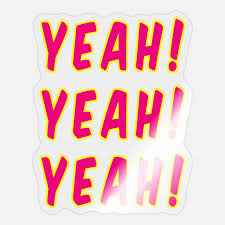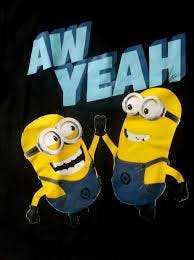I’m sorry if this hurts, but I’m doing it because I love you.
Yes, language is ever-changing. Yes, spellings evolve. But sometimes, when you’re a little too ahead of the curve on those changes, you look kind of dumb.
If you are writing anything other than a very casual text message, the word you’re looking for—the one that sounds like the beginning of “yammer,” the one that indicates a casual “yes,” the one that precedes “Let’s go, Rangers!”—is spelled YEAH.
No, it’s not flexible. If you’re a writer and write dialogue that includes “ya” or “yah” or “yea” (when those aren’t what you mean, which they probably aren’t), a copyeditor will change it. Always. To “yeah.” Because that’s the way it’s spelled.
This is not a pet peeve of mine. It’s a peeve, yes, but “pet peeve” implies that I’m only bothered by it for personal, intangible reasons. And that’s not the case. If you’re a writer and you submit a story with characters saying “yea,” it’s like turning in a story with typos in the first line. If you work in a bank and you reply to your boss’s email with “Yea, thanks,” she’s not going to be impressed. You’re not going to be taken as seriously. And I want you to be! I want you to find success and world domination!
Wait, what about “yea”?
This is pronounced “yay” (rhymes with “day”) and it’s an actual word—a pretty old-fashioned one that’s been around since the 6th century CE.
It’s the opposite of “nay,” as in “Are you voting yea or nay on the new guillotine proposal?” Or you might say “Yea verily, Winnifred pined for her prince.”
If you are not actively serving jury duty, you probably don’t need this one.
What about “ya”?
There are two possible pronunciations here, and (probably) neither is the one you’re looking for.
You could pronounce it “yuh,” indicating a casual “you.” As in, “Ya hungry?” or “See ya later!”
Or you could pronounce it “yah,” like the way a Swedish person would say yes (Ja!). If this is what you truly intend, there’s a better way to spell it (see below).
Honestly, if you write “Ya, let’s head over at nine,” I’m gonna read that whole sentence with a Swedish accent.

What about “yah”?
This would, as above, be pronounced “ya,” like the beginning of “yacht.”
Both “yah” and “jah” might be short for Yahweh, and my friend Merriam Elizabeth Webster says that with that etymology, it can also be an expression of frustration or contempt, so if that’s what you want, use it accordingly.
And you could absolutely use it to indicate “yes,” if and only if you want your character to pronounce it like the beginning of “Yamaha,” and not like the beginning of “yak.” There are plenty of accents and dialects for which you’ll want to use this as a phonetic representation of speech, and to my mind the H on the end of the word makes the pronunciation clearer and more intentional than the somewhat confusing “ya.”
What about “yay”?
This is what you say when you find a ten-dollar bill in your pocket. You already know how to pronounce this one.
What about in text messages?
Ya, sure, knock yourself out, yea. Will you look super smart? Not really. But then does it look smart to use more poop emojis than punctuation marks? Nah.
Who died and made “yeah” king?
The OED dates it to 1863, and also offers four different regional pronunciations. (Don’t you love it with the Brits, who will take the R off the end of any word, just stick it randomly onto the end of another?)
The etymology here is pretty simple and obvious: Sometimes people don’t like to close their mouths. That S is hard work! Say “yes” and then say “yeah.” Wasn’t the second one like a thousand times easier? Plus you can draw it out (“yeahhhhhh”) without sounding like a snake.
Why is English so hard?
English is hard even for native speakers (I misspell many things, including “whoa,” which is apparently not spelled “woah,” even though it should be)… But in the past year I started really studying Hungarian in earnest and lemme tell you, Hungarian makes English look like—not even like a walk in the park, more like taking the moving walkway through the park on a 72-degree day.
And listen, we can do this one thing. We can get this one common word right, and be better understood.
Yes, we can! Yea, forsooth!









I hate ya too. It reads lazy to me, but I could just be old.
Oh this is a peeve of mine too. Thank you for enlightening the people!